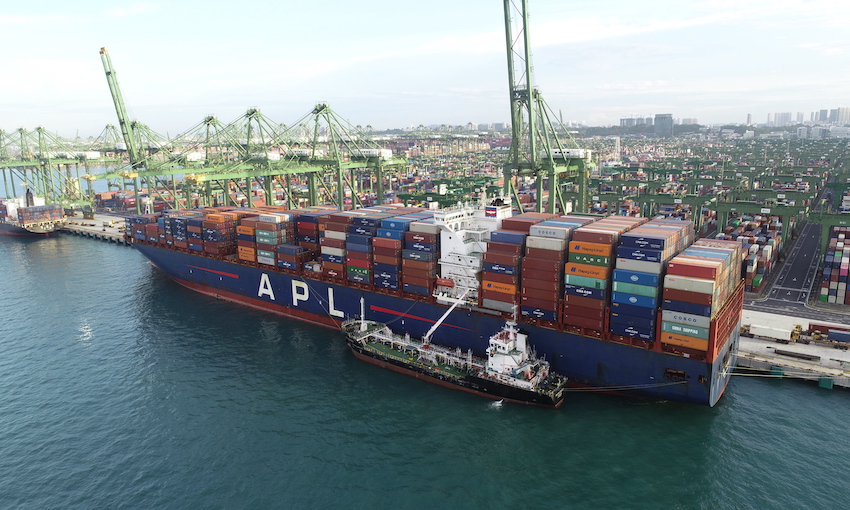CMA CGM has launched a biofuel bunkering trial in Singapore, with 10,640-TEU APL Paris the first and largest of up to 32 containerships to participate in the trial.
Bunkering was conducted alongside simultaneous container loading and discharging operations before the vessel is deployed on the Asia-South America rotation of the Pacific East Coast 2 service.
The global trial is supported by the Maritime and Port Authority of Singapore (MPA) and intends to scale up wider adoption of biofuel.
The containerships involved in the trial will receive different blends of biofuel to measure carbon dioxide and nitrogen dioxide emissions to obtain a trend analysis.
Ranging from 2200 to 10,640 TEUs the ships facilitating the trial will serve several trade lanes including Asia-South America, Asia-Africa, Asia-Oceania, Asia-Mediterranean, North Europe-Oceania, and North Europe-North America.
“This global biofuel trial and bunkering in Singapore advances CMA CGM’s energy transition, paving the way for biofuel to scale up as one of the solutions to decarbonise shipping,” CMA CGM Asia Pacific CEO Stéphane Courquin said.
“With the use of biofuels being assessed over multiple key trade lanes and onboard ships of various sizes, we shall gather a comprehensive data set to verify the biofuel’s performance as a marine fuel and gain insights into facilitating a wider adoption of biofuel as a clean fuel.”
Some vessels will be fuelled with B24 biofuel, which is completely compatible with modern ship engines and can reduce carbon emissions by up to 21%.
B24 can reportedly be run on all vessel types without requiring technical, safety, or deign adjustments, enabling ships to start limiting their emissions quickly.
“CMA CGM’s global biofuel bunkering trial demonstrates its commitment to clean energy transition in the shipping industry,” MPA chief executive Quah Ley Hoon said.
“As the world’s top bunkering and trans-shipment hub port, MPA is happy to facilitate APL Paris biofuel bunkering in Singapore.
“We will continue to work with industry partners like CMA CGM to promote the use of greener marine fuels and drive the transition towards sustainable shipping.”
In line with its commitment to become a net zero carbon company by 2050, CMA CGM also has a fleet of 25 e-methane-ready vessels in service.
This fleet is expected to expand to 44 vessels by the end of 2024.





